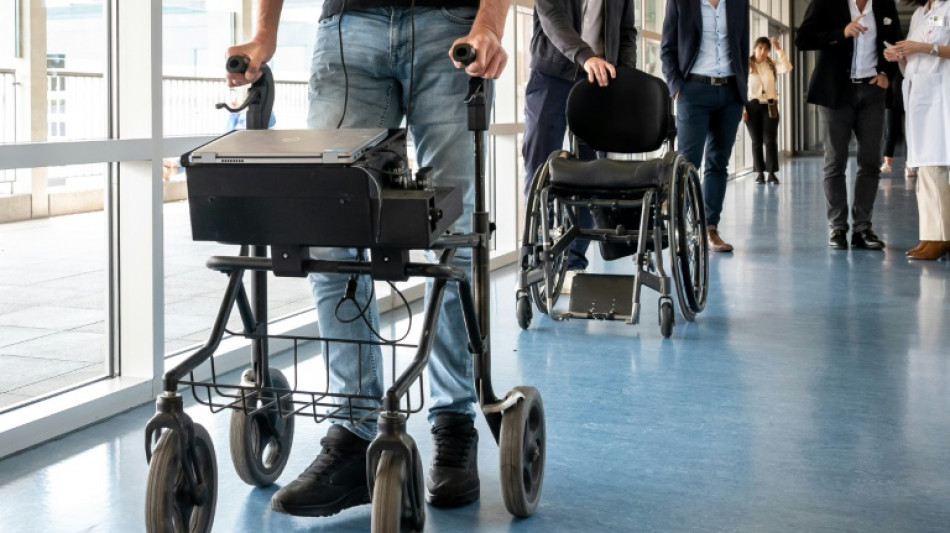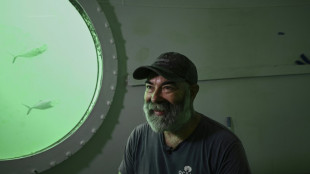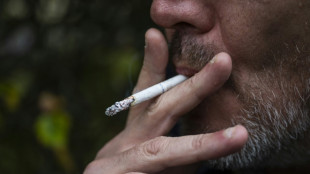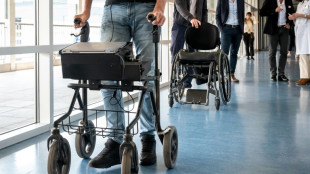
-
 Dutch F1 Grand Prix to end in 2026: organisers
Dutch F1 Grand Prix to end in 2026: organisers
-
Gunman held after failed attack on Sikh leader in India

-
 Pakistan recall Babar Azam for South Africa tour, Sajid Khan out
Pakistan recall Babar Azam for South Africa tour, Sajid Khan out
-
Seoul stocks sink amid S. Korea drama as Asian markets mixed

-
 French appeals court to rule in Polanski defamation case
French appeals court to rule in Polanski defamation case
-
Death toll rises to 29 in southern Thailand floods

-
 South Korean opposition move to impeach president after martial law bid
South Korean opposition move to impeach president after martial law bid
-
Trump's vows of quick peace fall flat on Ukraine frontlines

-
 Soldiers vs office chairs: South Korea's martial law standoff
Soldiers vs office chairs: South Korea's martial law standoff
-
Japan's Premier League pioneer Inamoto retires aged 45

-
 Second major Myanmar rebel group calls for talks with junta
Second major Myanmar rebel group calls for talks with junta
-
FIFA to reveal Club World Cup draw amid apathy, legal threats

-
 Taiwan's Lai arrives in Tuvalu to shore up Pacific allies
Taiwan's Lai arrives in Tuvalu to shore up Pacific allies
-
South Korean president pressed to step down over martial law bid

-
 Huge Vietnam fraud case raises questions over banking system
Huge Vietnam fraud case raises questions over banking system
-
Ghana thrusts economy into limelight in tight race for president

-
 Philippines says China Coast Guard fired water cannon, 'sideswiped' govt vessel
Philippines says China Coast Guard fired water cannon, 'sideswiped' govt vessel
-
Vietnam pushes electric motorbikes as pollution becomes 'unbearable'

-
 Seoul stocks sink amid S. Korea drama as Asian markets struggle
Seoul stocks sink amid S. Korea drama as Asian markets struggle
-
Hong Kong mega development plan to devour villages, wetlands

-
 French government risks falling in no-confidence vote
French government risks falling in no-confidence vote
-
Stokes fit as England name unchanged team for 2nd New Zealand Test

-
 Djokovic to begin bid for 25th Grand Slam crown in Brisbane
Djokovic to begin bid for 25th Grand Slam crown in Brisbane
-
Life has 'disappeared': Mexican city reeling from cartel infighting

-
 IXOPAY and Aperia Compliance Merge to Extend Advanced Payment Data Security to Merchant Acquirers and Merchants of All Sizes, Worldwide
IXOPAY and Aperia Compliance Merge to Extend Advanced Payment Data Security to Merchant Acquirers and Merchants of All Sizes, Worldwide
-
S.Korea political upheaval shows global democracy's fragility - and resilience

-
 Van Nistelrooy off to winning start at Leicester, Palace beat Ipswich
Van Nistelrooy off to winning start at Leicester, Palace beat Ipswich
-
Global stocks end mostly up with DAX crossing 20,000 for 1st time

-
 Georgia's ombudsman accuses police of torturing pro-EU protesters
Georgia's ombudsman accuses police of torturing pro-EU protesters
-
Norway, Sweden win big to reach Women's Euro 2025

-
 Partner of ex-Abercrombie & Fitch CEO pleads not guilty to sex trafficking
Partner of ex-Abercrombie & Fitch CEO pleads not guilty to sex trafficking
-
Leverkusen eliminate Bayern from German Cup after Neuer sees first red

-
 Syria rebels 'at gates' of central city Hama
Syria rebels 'at gates' of central city Hama
-
Amazon launches AI models to challenge rivals

-
 Bolivian ex-president, who fled to US, sentenced to six years prison
Bolivian ex-president, who fled to US, sentenced to six years prison
-
Bayern's Neuer sent off for first time in 866-game career

-
 Namibia elects its first woman president
Namibia elects its first woman president
-
Scottish artist Jasleen Kaur wins 2024 Turner Prize

-
 Barca hit five as they return to winning ways at Mallorca
Barca hit five as they return to winning ways at Mallorca
-
S. Korea president says will lift martial law

-
 Olympic champion Evenepoel breaks hand, shoulder in postal van collision
Olympic champion Evenepoel breaks hand, shoulder in postal van collision
-
Syria rebels advance on central city

-
 S. Korea's President Yoon, embattled conservative
S. Korea's President Yoon, embattled conservative
-
UK museum in talks with Greece over 'long-term' deal for Parthenon Marbles

-
 What we know about South Korea's martial law
What we know about South Korea's martial law
-
Biden announces $1 bn for Africa during maiden trip

-
 Retailers point to solid US sales over holiday weekend
Retailers point to solid US sales over holiday weekend
-
Europe-loving Blinken on last trip to NATO before Trump handover

-
 Seeking a new way of life under the sea - and a world record
Seeking a new way of life under the sea - and a world record
-
Defying headwinds, German stocks hit milestone


Brain stimulation can help injured people walk: study
Scientists said Monday that electrically stimulating a particular region in the brain could help people with injured spinal cords walk more easily, with one patient describing how the technique allowed him to conquer his fear of stairs.
The new technique is intended for people with spinal cord injuries where the connection between their brain and spinal cord has not been totally severed, and who still have some movement in their legs.
Wolfgang Jaeger, one of two patients who took part in an early trial, said that it immediately made a "big difference" to his mobility.
"Now when I see a staircase with just a few steps, I know I can handle it on my own," the 54-year-old said in a video released alongside a new study in the journal Nature Medicine.
The research was conducted by a Swiss team that has pioneered several recent advances, including using electrical stimulation of the spinal cord to let several paralysed patients walk again.
This time around, the researchers wanted to figure out which region of the brain was most responsible for people recovering from spinal cord injuries.
- 'I feel the urge to walk' -
Using 3D imaging techniques to map out the brain activity of mice with these injuries, the team created what they called a "brain-wide atlas".
They were surprised to find that the brain region they were looking for was in the lateral hypothalamus, which is otherwise known as a regulator for arousal, feeding and motivation.
A particular group of neurons in this region "appears to be involved in the recovery of walking after spinal cord injury," neuroscientist Gregoire Courtine at Switzerland's Ecole Polytechnique Federale de Lausanne told AFP.
Next, the team sought to amplify the signal from these neurons using a procedure called deep brain stimulation, which is commonly used to treat movement problems in people with Parkinson's disease.
It involves a surgeon implanting electrodes in the brain region, which are connected to a device implanted in the patient's chest. When switched on, the device sends electrical pulses up to the brain.
First, the team tested their theory on rats and mice, finding that it "immediately" improved walking, the study said.
The first human participant of the 2022 Swiss trial was a woman who, like Jaeger, has an incomplete spinal cord injury.
Neurosurgeon Jocelyne Bloch told AFP that when the women's device was turned on for the first time, she said: "I feel my legs."
When they turned up the electrical current, the women said, "I feel the urge to walk," according to Bloch.
The patients could turn on their device whenever they needed, and also went through months of rehab and strength training.
The woman's goal was to walk independently without a walker, while Jaeger's was to climb stairs by himself.
"Both of them reached their goal," Bloch said.
- 'No problem' -
Jaeger, who is from the Swiss municipality of Kappel, spoke about facing eight steps down to the sea during a holiday last year.
With the device turned on, "walking up and down the stairs was no problem," he said.
"It's a great feeling when you don't have to rely on others all the time."
Over time, he "became faster and could walk longer" even when the device was switched off, he added.
More research is still needed -- and this technique will not be effective for all patients, Courtine emphasised.
Because it depends on boosting the brain's signal to the spinal cord, it depends how much signal was getting through in the first place.
And while deep brain stimulation is now fairly common, some people are not so "comfortable with someone operating on their brain," Courtine added.
The researchers believe that in the future, the best option for recovering from these kinds of injuries could be stimulating both their spinal cord and lateral hypothalamus.
G.Schulte--BTB




